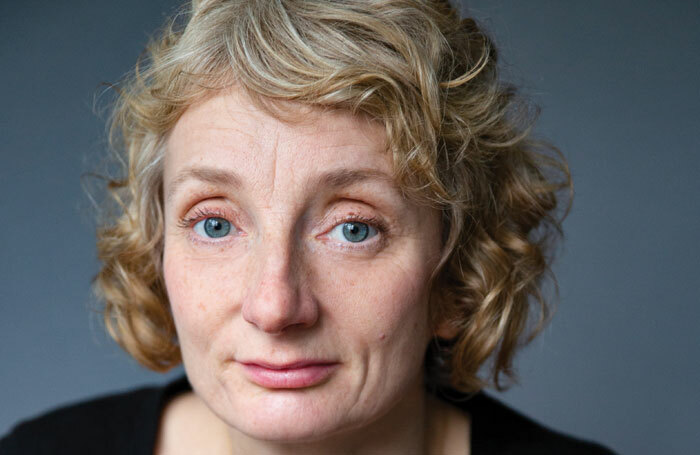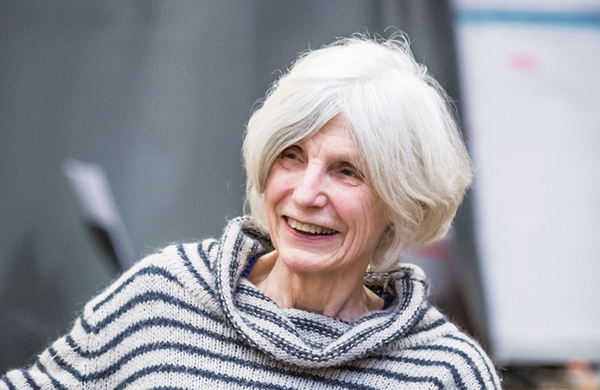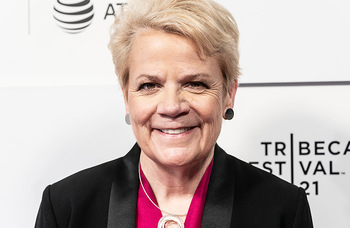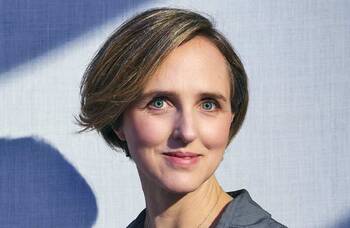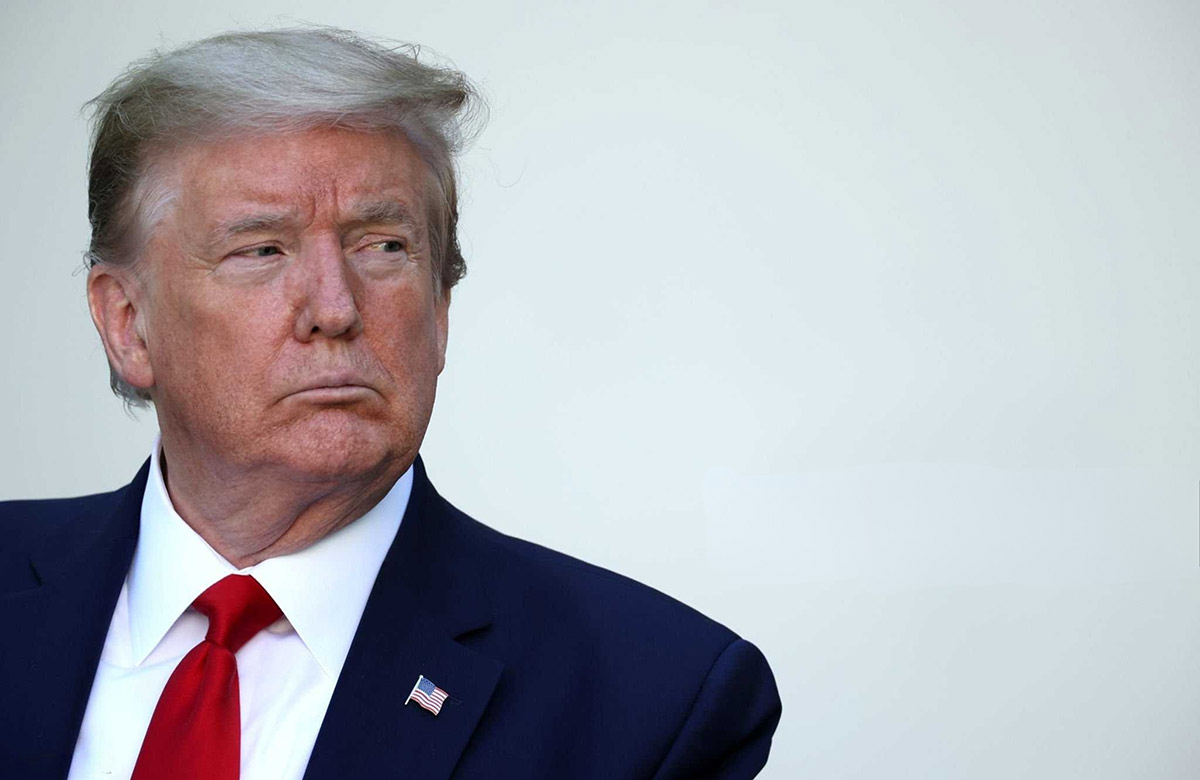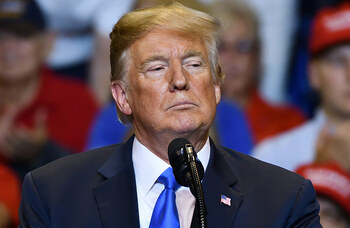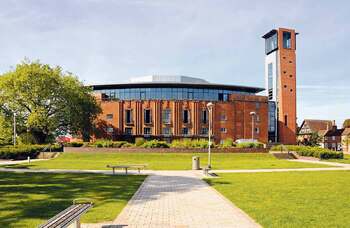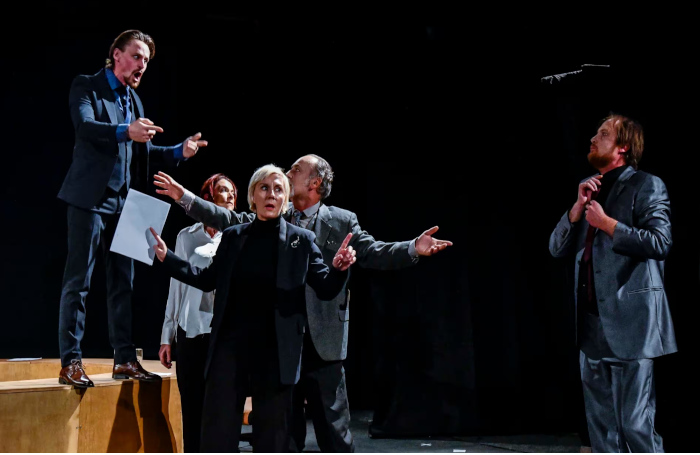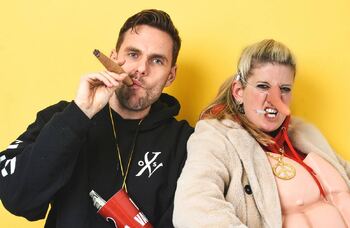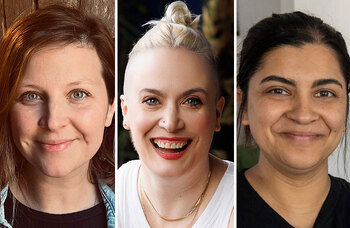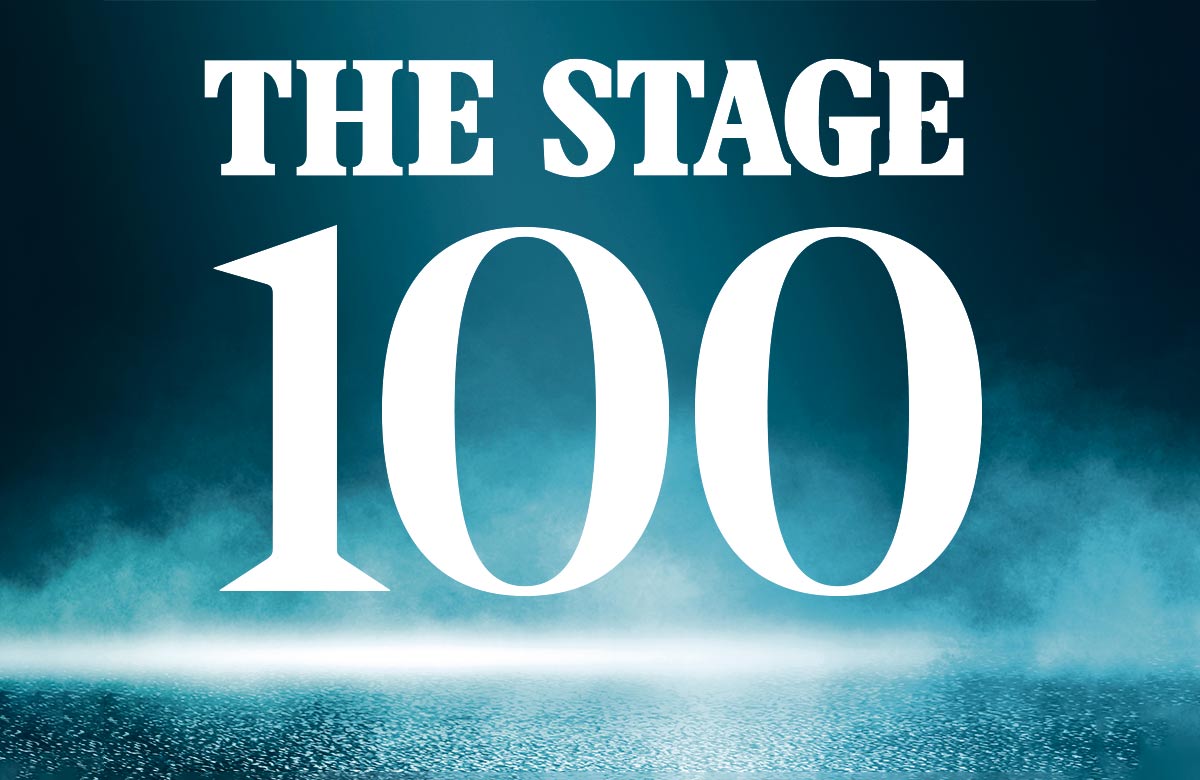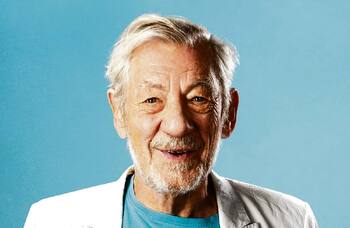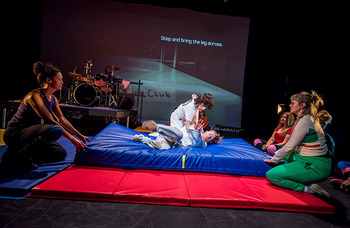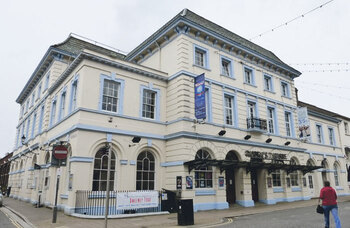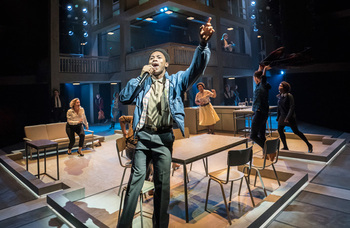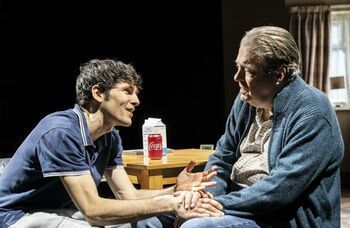Top Girls star Amanda Lawrence: 'This thing about being a mum and an actress – it’s big'
The last time she was on stage at the National Theatre, Amanda Lawrence played an angel in Marianne Elliott’s acclaimed production of Angels in America. Two years on she’s back as a pope. Lyndsey Turner’s revival of Caryl Churchill’s Top Girls opened this week at the Lyttelton.
The 1982 play – once described by the Guardian critic Michael Billington as “the best play ever by a woman dramatist” – is a modern classic and seminal feminist text.
It opens at a dinner party thrown by 1980s career woman Marlene to celebrate a promotion; her fellow guests are famous women from history and fiction. They include Patient Griselda from Chaucer’s Canterbury Tales, the explorer Isabella Bird, and Pope Joan – who turned out to be a woman disguised as a man. She lost a child, and was stoned to death for the deception. Over several courses, and bottles of wine, the women share their stories, all of which reveal the personal cost of trying to succeed in a man’s world.
Despite turning 80 in September, Churchill has been very involved in the production. She has been dropping into rehearsals and answering questions with lengthy, generous emails, says Lawrence. “You can ask Caryl anything. She is the most wonderful woman. She is a beauty. So sharp, so curious and clever. I’m really in love with her.”
She’s not the only one. Churchill is regularly cited by her fellow playwrights and critics as British theatre’s most influential living writer, and part of the reason is her revivals often feel bracingly fresh. “There’s a hunger for Caryl’s work,” says Lawrence. “It is just so brilliantly written.”

This is her third Churchill play, following Dominic Cooke’s production of Here We Go, and Turner’s revival of Light Shining in Buckinghamshire, both at the National in 2015. “Her plays go everywhere. They’re set in all different scenarios and places and worlds.”
But how difficult are they to perform? While Top Girls turns into something much more naturalistic, following Marlene at work and with her family, the opening scene is a stylistic challenge. In her play texts, Churchill pioneered the use of a forward slash to indicate overlapping dialogue, and the dinner party is where this is used to most startling effect, the women talking over each other at considerable, cacophonous length.
Lawrence acknowledges that, initially, their cast was just motor-mouthing, trying to crack the precision timing. The breakthrough has been starting to really listen. “Any drama gets better the more you listen to the other person. Something’s flipped in the past week, you go: ‘Oh my God, I’ve really heard your story’.”
Here We Go review at the Lyttelton, National Theatre, London – ‘hypnotic, but stultifying’
These are not women rudely interrupting each other – as has sometimes been perceived – but rather women starved of female company, with a huge appetite and need to share and hear each others’ stories. “We speak on top of each other, but it’s just very natural, women connecting stories,” Lawrence says. “It’s interesting that people thought that was pushy, competitive – ironically, that is a major theme in the play. But that’s not what we do in that scene.”
For the first time, Top Girls isn’t being double cast – so Lawrence plays Pope Joan and then doesn’t appear again. But she’s found it fascinating watching the second half: Churchill captures the growing gap between ruthless ‘career women’ chasing success in Thatcher’s Britain, and those less fortunate who are cruelly left behind. The play absolutely nails down its historical moment: the point when greed became good, when individualism began to trump the collective.
But in doing so, it also makes us consider our own moment, Lawrence thinks. “It’s like when I did Angels in America – that was set in 1985, and when we took it to America, audiences would go: ‘Oh my God, it’s talking about the Reagan era and now we’ve got Trump.’ I think there’s a bit of that [with Top Girls]: strange, scary things reflected back to us.”
Does she think we’re still grappling with that inheritance, the individualism and selfishness of the 1980s? “Oh god yes. I remember my dad saying institutions that should be for the people have turned upside down, and it’s about making profit.”
By focusing on women, Top Girls is also a snapshot of a moment in which it felt like feminism faltered, women mimicking the toughness of men in order to get ahead. “Some feminism got caught up in ruthlessness,” Lawrence agrees. “Being cruel isn’t success, it’s being cruel. It’s greed.”
Continues…
Q&A Amanda Lawrence
What was your first non-theatre job?
Care assistant in an old people’s home.
What was your first professional theatre job?
Doctor Faustus with Compass Theatre Company in Sheffield.
What do you wish someone had told you when you were starting out?
Don’t feel you need to please everyone and say yes to everything. Breathe. Take your time. You are an artist as well.
Who or what was your biggest influence?
My son – it’s very interesting watching him play, and the freedom of that.
What’s your best advice for auditions?
Listen to what they say – but know who you are, settle with who you are when you walk in. If you have negative thoughts, try to put a gap with that feeling; think: “What have I learned from that?”, or “Did I want to work with them?”
If you hadn’t been an actor, what would you have been?
There’s nothing else I can do. Maybe occupational therapy or drama therapy.
Do you have any theatrical superstitions or rituals?
I do big deep-yoga breathing, and I always make sure I make eye contact with every person I’m on stage with. And I have a poo – that is so important.
While Lawrence may consider herself more of an ensemble actor than a star, she made a real impression in 2017 as the angel in the Olivier award-winning Angels in America. She was given the seal of approval by New York Times critic Ben Brantley, who called her performance “first rate”.
Working in the production was “phenomenal”, she says, before adding: “I thank Marianne Elliott for giving me the job because I felt like it was a bit of a risk.”
Marianne Elliott: ‘Insecurity is part of the fabric of what we do. Everyone is insecure’
Taking the show to Broadway was also huge. Audiences, she recalls, were “literally leaning forward, hungry for this play”.
But it was also difficult, mainly because she missed her son. Her child with partner Carl Grose, the playwright and Kneehigh deputy artistic director – they met through the company, with Lawrence a stalwart there for about five years – was just four when she went to Broadway. “You can’t take children out of state schools, so my son only came out to see me twice,” she says. “Doing theatre most of my life, I haven’t earned much money, so this was a chance to make some savings. But I really struggled, just because I missed my son.”
Theatre needs to support parents better, she continues. “This thing about being a mum and being an actress – it’s big. And now we are talking about it and learning how we can do both. There needs to be as much support as possible.”

She’s had that support on Top Girls: “Now I say I can’t do evenings, can’t do weekends till near the tech. Lyndsey was great – but you have to say it. You have to create a balance and look after yourself. You get ill otherwise, or very shaky, trying to make everything work. As women we put a lot of pressure on ourselves to say we’re mentally and physically fine. And we’re not.”
Perhaps her most surprising recent role was in Hollywood blockbuster Star Wars: The Last Jedi, where she played Commander D’Acy. She “had a ball” working for “such a huge machine” she says, though again – with her son then being just two years old – she was chronically short on sleep and really started to feel the pressure. Her involvement developed in a rather improbable fashion. “I was doing Nell Gwynn at Shakespeare’s Globe, and heard on press night that the new director of Star Wars was in – and I didn’t think anything of it. And then I got a call a few weeks before filming.”
Nell Gwynn review at Shakespeare’s Globe – ‘warm and sympathetic’
It was meant to be a little non-speaking part, but she hit it off with the director Rian Johnson – “one of the loveliest human beings you will ever meet” – who eventually gave her a speaking role. She had to learn lines on the day, from an iPad. “Then they delete it and you’ve got to remember it – you aren’t given a script. So you start getting a bit panicky.”
Not that it shows: from playing a loyal member of General Leia’s Resistance forces to striding into a dinner party like she’s the rightful head of the Catholic Church, Lawrence doesn’t seem to have problem commanding a space, and playing smart, strong women.
“Caryl said to us really early in rehearsals: they’re clever women,” Lawrence says of the characters on Top Girls. “They’re not feeling sorry for themselves. These are not sob stories – they’re success stories.”
CV Amanda Lawrence
Born: Torbay, 1971
Training: Bretton Hall
Landmark productions:
• Angels in America, National Theatre (2017)
• Here We Go, National Theatre (2015)
• Henry VIII, Shakespeare’s Globe (2010)
• Jiggery Pokery, Battersea Arts Centre/tour (2009)
• The Wooden Frock, Kneehigh (2004)
Agent: Sarah Spear and Grace Clissold at Curtis Brown
Top Girls is at the National Theatre until June 22, 2019. Details: nationaltheatre.org.uk
Caryl Churchill at 80 – celebrating UK theatre’s ‘ultimate playwright’
Opinion
Recommended for you
More about this person
Opinion
Recommended for you
Most Read
Across The Stage this weekYour subscription helps ensure our journalism can continue
Invest in The Stage today with a subscription starting at just £7.99
